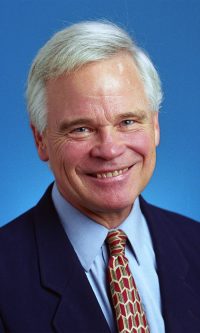DG MARTIN COLUMN: Dr. Gilmer and Mr. Hyde
Imagine being a patient of a doctor, one whom you loved and trusted, one who also murdered and mutilated his own father.

D.G. Martin
Such an experience forms the basis for a new book, “The Other Dr. Gilmer: Two Men, A Murder, and an Unlikely Fight for Justice,” by Benjamin Gilmer.
This very real tragedy happened to the patients of the Cane Creek Family Health Center near Asheville where the doctor-murderer, Dr. Vince Gilmer, practiced medicine until June 2004, when one day he strangled his father with a rope, cut off his fingers and left the body on the side of a road in Virginia.
Vince Gilmer returned to the clinic after the murder and practiced medicine as if nothing happened for several days until he was arrested for murder.
Several years after Vince’s arrest and trial and imprisonment in the Wallens Ridge, Virginia, prison, the book’s author, Dr. Benjamin Gilmer, a graduate of Davidson College and East Carolina University’s medical school, began to work at the Cane Creek clinic.
Naturally, there was confusion. The two doctors were not related, but understandably the patients thought there must be some connection.
Over time, Benjamin’s patients told him more and more about Vince. They said he was a fine doctor and a wonderful person. Vince took special care, sometimes taking troubled patients on walks or giving them great big bear hugs.
Benjamin became more curious about his predecessor with the shared name. His curiosity developed into a compulsion to find out how and why and what actually happened to Vince. “Something wasn’t right, he says, “I couldn’t let it go.”
He began to visit the prison at Wallens Ridge, where Vince was incarcerated.
These visits convinced Benjamin that Vince had serious mental health issues not recognized by or of concern to the prison officials. Without treatment Vince would never get better and the demons of his mental illness would destroy him.
Benjamin also read hundreds of pages of transcripts of Vince’s murder trial. Vince had tried to represent himself. He succeeded only in convincing the judge and jury that he was faking mental illness. They thought he was using the skills and knowledge of a sane physician to try to act mentally disturbed and avoid responsibility for a brutal murder.
From his study of Vince’s situation, Benjamin believed that Vince had multiple conditions that could have caused his mental illness. Most important to him was a finding that Vince suffered from Huntington’s Disease, an inherited condition that ravages its victims and causes bizarre conduct.
If Vince’s condition had been known at the time of his trial, Benjamin believed that he would have, at worst, been found not guilty by reason of insanity. Rather than petition for a new trial which would have taken years, Benjamin and his advisors and volunteer professionals asked Virginia governors for clemency.
First, they petitioned Gov. Terry McAuliffe, hoping he would act before he left office in January 2018. He did not. So Benjamin’s volunteer legal helpers pointed to McAuliffe’s successor, Ralph Northam, a physician and a neurologist. They thought he would be understanding.
The book ends on a sad note. As his term ended in January 2022, Northam rejected the clemency petition for Vince.
At the end of his book, Benjamin writes, “It is difficult not to react to this latest setback with anger and disillusionment… I am filled with fury and sadness — for Vince, his family, for all the mentally ill people in prison just like him.”
A sad ending for this book.
But there is more to the story. Somehow, Northam got and read a pre-publication copy of “The Other Dr. Gilmer” and was convinced to grant Vince clemency, just in time.
Others who read this fine book will, like Northam, be transformed.

